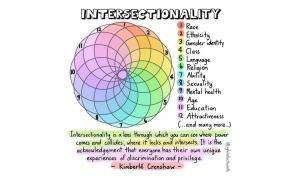SWU Blog: Intersectionality is a valuable tool for Social Work Practice
During the month of February we mark both LGBT+ History Month and Race Equality Week. These important events give us an opportunity to discuss and examine a useful tool for social work that many practitioners may be interested in incorporating into their practice: intersectionality.
In a nutshell, “intersectionality” describes how individual characteristics – including race, class, gender, age, and more – “intersect” with one another and overlap. It also asks us to consider how this affects people’s different experiences of both marginalisation and privilege.
The term was coined in 1989 by legal scholar and civil rights activist Professor Kimberlé Crenshaw, who recently described her use of intersectionality as “a prism to bring to light dynamics within discrimination law that weren’t being appreciated by the courts.” She said, “In particular, courts seem to think that race discrimination was what happened to all black people across gender, and sex discrimination was what happened to all women, and if that is your framework, of course, what happens to black women and other women of color is going to be difficult to see.”
First gaining traction in academia, “intersectionality” has increasingly entered mainstream discussion over the last five years. When an academic concept jumps into common use, its meaning can become less clear. There is a popular misconception that intersectionality is a kind of “oppression Olympics”, with a hierarchy that places those who experience the most discrimination at the top and those who have the most privilege at the bottom. This is not the case. The aim of intersectionality is to eliminate the current system of identity hierarchies and create a more egalitarian system, and recognising how identities interact is a big part of that.

In the context of social work, intersectionality is a valuable tool for analysing how different forms of oppression – such as ageism, racism, sexism, ableism, heterosexism, cissexism, and classism – interact and intersect to influence lived experiences. People’s combination of identities matter. Considering the multiple facets of a service user’s identity is a person-centred approach that allows social workers to better understand their needs and support them. Intersecting identities may mean that a person experiences multiple forms of oppression, and if we don’t acknowledge their intersecting identities then we run the risk of making assumptions based on simplified or partial information.
For example, a social worker might think they have a good understanding of how to support a service user who is LGBT+. But if they have based their assumptions on the experience of white LGBT+ people, they run the risk of not taking into account how race affects the experiences of LGBT+ people from non-white communities. Everyone has a unique kaleidoscope of identities. That means that everyone has different experiences when it comes to encountering bias or barriers, even among people with similarities based on group identity.
Intersectionality also calls on us to consider how our identities can privilege us in some circumstances, and marginalise us in others. A white lesbian woman can be subjected to discrimination on the basis of her gender or sexuality, but can also find herself privileged on the basis of her race.
The concept of “privilege” carries some baggage, but it’s an important component to understanding intersectionality. Many who hear the term “privilege”, especially if it is applied to them, perceive it to mean that people think they have had an easy life. However, privilege is not about having special advantages; it’s about not encountering barriers that are present for other people.
People have privilege because they belong to a group – for example: being heterosexual – and this privilege often manifests in the barriers that they don’t encounter because they belong to that group. Saying that someone has privilege is not a moral judgement. Privilege is like an invisible backpack that everyone carries around, with some people having much fuller backpacks than others. This perspective on privilege is from Peggy McIntosh's essay "White Privilege: Unpacking the Invisible Knapsack" which was written with the intent to inspire "self-reflection, enhancing their capacity for empathy and compassion."
Intersectionality encourages us to reflect and question our assumptions and value the diversity and unique qualities each person brings. As a social worker an intersectional approach supports your assessment, risk assessments, care planning, and reviewing. It also leads to effective inclusion by supporting us to understand the subjective experiences of those with marginalised and stigmatised identities.
As a final point, it is important to take into account that some identities are fluid – people age, change their religion, experience a change in social status, experience a change in mental health, attain more education, and other factors. Life is dynamic and so are people, and we need to keep this in mind when supporting them.
This blog was written by SWU Communications, Policy, and Engagement Officer Shawn Major with contributions from Narinder Sidhu who is an Equality and Inclusion Consultant, Social Work academic, and SWU member.